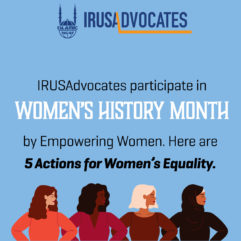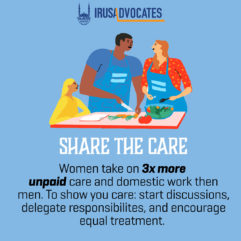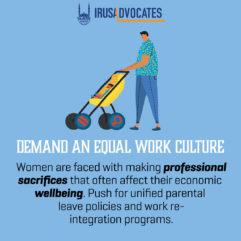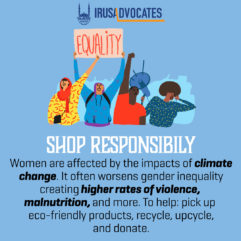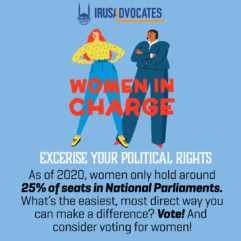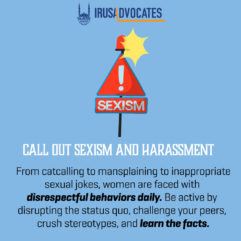In honor of #WomensHistoryMonth it’s crucial to share the facts and spread light on inequality issues. Become an advocate of #womensrights and practice these 5 actions. Silence is enablement. Let’s #BreakTheBias together.
IRUSA Celebrates Women’s History Month
The Issue
Gender Justice
Many countries allow different ages, below 18, as the legal minimum age for marriage, with parental consent. “Early marriage has devastating consequences… According to the 2012 Demographic and Health Survey, in Niger 57 % of girls aged 10-14 are not attending school, because it is considered that married girls are expected to stay at home.” Habou Illyassou, Child Welfare Coordinator, IR Niger, Niamey office.
Based on a wealth of research and our own experience in poor and marginalized communities, Islamic Relief believes that 18 is a more appropriate age threshold for both females and males; this falls inline with Islamic Relief’s Child Protection Policy. A minimum age of marriage of 18 will ensure that young spouses have the minimum level of maturity needed before marrying and are able to give their free and full consent to marry.
The fundamental reason for Islamic Relief’s work on this issue is to protect the rights of children and young people, including their right to good health, adequate family protection and high quality education. This is particularly important in the context of poverty, conflict and humanitarian crises, where children are more vulnerable to abuse. Furthermore, by recognizing 18 as the ideal minimum age for marriage, we aim to protect the institution of marriage by promoting marital union between responsible young adults whose maturity will better equip them to build a healthy family and fulfill their responsibilities to protect their children’s well-being as parents and guardians. We aim to ensure that all children can access opportunities and develop capabilities to come out of the cycle of poverty, which is often perpetuated by early and forced marriages.
As such, Islamic Relief is calling for an end to Early and Forced Marriage (EFM) as part of its wider strategy to promote universal human rights and in particular, establish gender justice, ensure child protection, promote healthy families and provide appropriate Islamic solutions in Muslim communities. Our teams identified EFM as a serious issue hindering females and communities at large from improving their well-being. We will work with our partners to advocate for greater inclusive protection for women and children of all abilities and contribute to the global effort to end EFM.
What We Are Doing
Islamic Relief is working in countries with high and highest Early and Forced Marriage (EFM) prevalence, such as Niger, Bangladesh, Chad, Mali, India, Ethiopia, and Malawi. Our teams identified EFM as a serious issue hindering females and communities at large from improving their wellbeing. We have been addressing this problem through multi-sector and integrated approaches, applying culturally sensitive and sustainable strategies, to help communities achieve most effective development outcomes. A clear organizational policy stance on EFM will further strengthen the effectiveness of our interventions.
Our work to end EFM will be guided by research into EFM in specific contexts and tailor-made interventions that are effective, culturally appropriate and sustainable.
Integrated and tailored approach to ending early and forced marriages by targeting a number of inter-dependent issues including educational, socio-cultural, economic, religious, legal and health factors.
Implement direct programs tackling EFM and include efforts to end EFM as part of our wider emergency and development programs.
Carry out research and assessment prior to intervention to ensure our work is relevant, culturally sensitive, effective and sustainable.
Work closely with partner organizations that have the same goal, advocate for greater inclusive protection for all women and children of all abilities and contribute to the global effort to end EFM.
Work to safeguard the rights of all, by raising community awareness about the harms of EFM, importance of education, empowering females, improving the health of communities, supporting parents and guardians to fulfill their responsibilities and ultimately understand and promote the sanctity of marriage.
Take a human rights and community-based approach to ending EFM, and our interventions will be based on the principle of ‘do no harm.’
What’s more? A focus area of IRUSA’s humanitarian work is dedicated to the empowerment and promotion of programs for women and girls. By providing the right tools and resources, we aim not only to help women and girls trail their paths toward better education, livelihood, and more, but by doing so, their communities will also grow and thrive, cutting the binds of poverty that chain them.
What You Can Do
Want to learn how you can get involved in advocating for gender justice, against early and forced marriages, and other related topics? Connect with us at [email protected].
